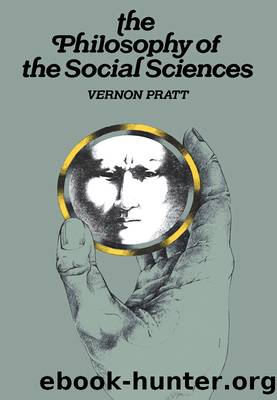Philosophy and the Social Sciences by Vernon Pratt

Author:Vernon Pratt [Pratt, Vernon]
Language: eng
Format: epub
ISBN: 9780415042888
Barnesnoble:
Publisher: Taylor & Francis
Published: 1978-11-09T00:00:00+00:00
3 Value judgements and arbitrariness
The problem that this approach to morality encounters, howeverâor one of themâis that of giving an account of how value judgements are arrived at. The facts of a situation, we have just seen it argued, do not in themselves support any conclusion about what ought to be, or ought to be done. Such a conclusion follows only if a value judgement is added to the factsâand then the question is, where that value judgement originates. Value judgements, it seems, can only be derived on the basis of prior value judgements, so that the idea that we can test a moral belief of ours by looking simply to the facts, or that we can argue against a principle with which we disagree by citing merely factual evidence, is to be rejected.
Can we arrive at moral principles by the exercise of âpure reasonâ unaided by any factual considerations? That is one avenue that has been explored. Another is the possibility that moral principles are somehow embedded in the structure of the universe and are discerned by a kind of sixthâor âmoralââsense. But it is. a third approach which has been of particular influence in recent moral philosophy and which correspondingly has played a major role in conceptions of the relationship between moral beliefs and social study. It is the idea that ultimately moral principles are things one simply opts for. They are incapable of being supported by factual evidence, they are not apprehended by any moral sense, and a priori reasoning is inappropriate.
In an act of selection which is worse than blindâfor there is nothing there for a sighted man to seeâoneâs moral principles are on this view simply chosen; though indeed it may be questioned whether the notion of choice makes sense in such a completely guideless situation. A man who declared that he happened to believe that all Jews ought to be murdered would thus, on this view, be doing no more than exercising his right to choose whatever moral principles he chose to choose! So long as he accepted all the logical implications of his principle, no factual evidence, no reasoning, could even tend to show that it was misguided. Others might happen to believe that killing people was wrong. So be it! As far as moral principles are concerned, one must simply take oneâs pick.
Download
This site does not store any files on its server. We only index and link to content provided by other sites. Please contact the content providers to delete copyright contents if any and email us, we'll remove relevant links or contents immediately.
Harry Potter and the Goblet Of Fire by J.K. Rowling(3046)
Never by Ken Follett(2882)
Shadow of Night by Deborah Harkness(2718)
Ogilvy on Advertising by David Ogilvy(2682)
Zero to IPO: Over $1 Trillion of Actionable Advice from the World's Most Successful Entrepreneurs by Frederic Kerrest(2396)
The Man Who Died Twice by Richard Osman(2300)
Machine Learning at Scale with H2O by Gregory Keys | David Whiting(2292)
Book of Life by Deborah Harkness(2263)
How Proust Can Change Your Life by Alain De Botton(2261)
My Brilliant Friend by Elena Ferrante(2224)
0041152001443424520 .pdf by Unknown(2220)
The Tipping Point by Malcolm Gladwell(2205)
How to Pay Zero Taxes, 2018 by Jeff A. Schnepper(2100)
Will by Will Smith(2043)
Purple Hibiscus by Chimamanda Ngozi Adichie(1982)
Hooked: A Dark, Contemporary Romance (Never After Series) by Emily McIntire(1960)
Borders by unknow(1786)
Rationality by Steven Pinker(1765)
Daughter of Smoke and Bone by Laini Taylor(1744)
